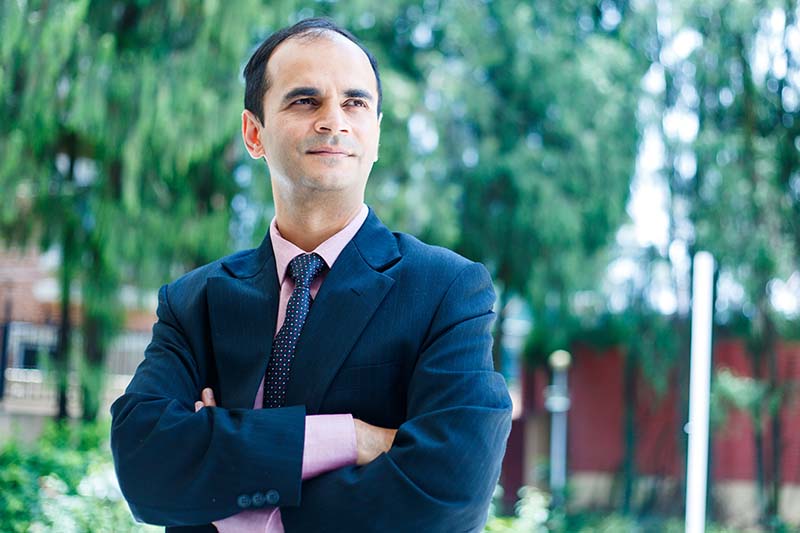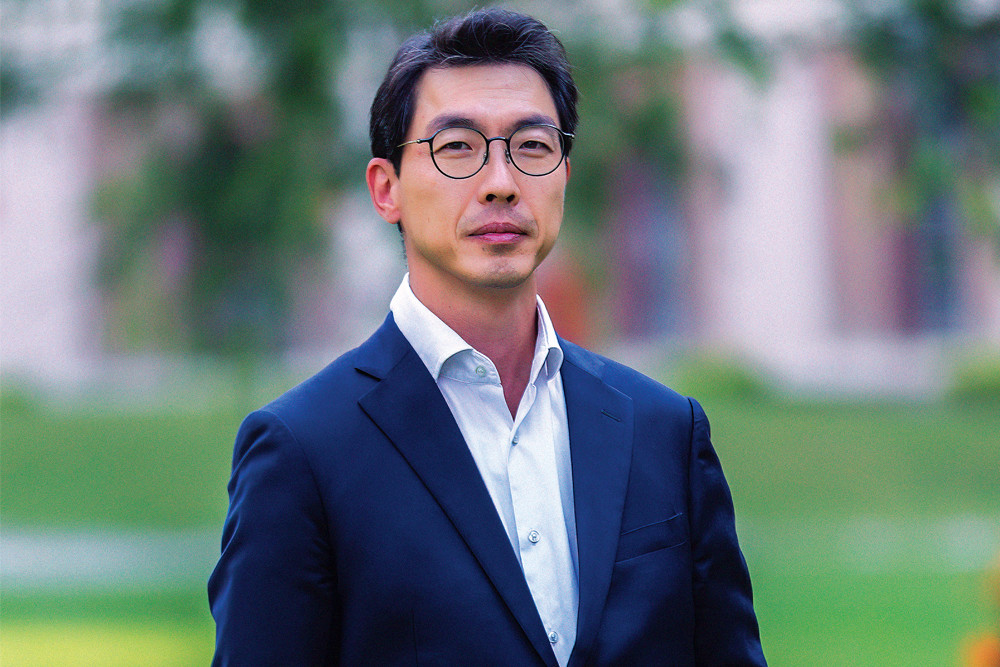
Bijay Rimal is the General Manager, Operation & Non-Clinical Services, Nepal MediCiti which is slotted to be a world class health establishment offering multi super specialty expertise. Business 360º spoke to Rimal to learn about MediCiti’s plans and how it is placing itself in the current healthcare sector. Excerpts:

How was the idea of MediCiti conceived?
We located a host of big cracks in the existing health sector in the country. Given the fact that Nepal still struggles to facilitate primary and secondary level health care services, it is analogous to wishful thinking discussing tertiary and quaternary level services in respect to Nepal. But the latter two are needed to establish as world-class health care center. Additionally, MediCiti is in the race to become the first Jo int Commission International (JCI) accredited hospital in Nepal. Every year, a large number of the country’s population act as medical tourists seeking medical treatments abroad, especially in India, Thailand and Singapore. MediCiti is trying to uproot the notion that one must travel abroad for excellence in health checkups and services. Furthermore, Government is soon to implement a rule for politicians, who earlier went abroad on government funded medical treatments to treatment in Nepal. Hospitals here are capable of handling every kind of medical complications. Besides, we want to prevent the best experts from migrating to foreign nations for lucrative job prospects. The other reason for opening this hospital is to entertain medical tourism. Every year, around 4,000 international climbers get injured - in small or big mishaps - during expeditions. Only 400-500 climbers get treated in Nepal and that too for minor injuries. The rest seek medical assistance elsewhere. MediCiti wants to address this trend. However, all international insurance companies allow their clients to get treated only in the JCI accredited hospitals. Our goal is to handle cases of international patients in Nepal. It can be the new hub for medical tourism. If international agencies trust us, then, automatically, Nepalis will do too.
How does MediCiti differentiate itself from the existing and growing number of private hospitals already here?
Most organisations are venturing into hospitals but running them as trading businesses. Rather, the need of the hour is to develop the health care sector into an industry. It is high time we usher a paradigm shift. JCI provides accreditation to any hospital against two imperative components: Quality Service and Patient Safety. Our hospital assures the same two. MediCiti boasts of having the largest hospital building in Nepal. Out of 450 ropani land that we own, the hospital covers 75 ropani. Soon we will have medical college, health facilities and international medical team, all housed within the same property. It will exude an appearance of a city - a medical city - that is the reason we named it MediCiti. We are introducing the concept of ‘Own Hospital, Own Doctors’. The physical body of the hospital is ours and the doctors employed by the hospital are exclusive of it. The medical experts that are engaged with us need to be committed to us. Patients must get the facility to see a particular doctor in the hospital, no matter how renowned s/he is. Along with doctors, we are also taking administrators and technicians into account and making it against the rule for them to work at other hospitals once they sign a contract with us. Government is grappling with the same problem. Government doctors do part time and understandably patients are at mar. Such a culture will not be practiced at MediCiti. Ours is 700 plus bedded multi super specialty hospital. In the initial phase, we have six centers of excellence: cardiac, neuro, gastro, cancer, renal, and orthopedics and sports. We have a tie-up with Oxford University on matters pertaining to oncology.Let’s talk about your pool of doctors…
Our efforts to bring home dedicated Nepali medical experts dispersed in foreign lands are ongoing. However, the first priority will be given to Nepali doctors residing here. Second come NRN doctors. Lastly, our door opens up for international doctors who are needed on rare occasions.What other plans have you laid out for the future?
Our Founder and Chairperson Dr Upendra Mahato has recently announced that he will be building a total of 10 hospitals in Nepal. In about five years, we will have five hospitals inside the Valley and five more in major cities across the country. All the hospitals will enjoy the same magnitude as this one in Bhaisepati. We want to develop the concept of chain hospitals in the country. Nepal lacks professionals in a few areas. For example, we don’t have a medical oncologist. But since we have listed oncology in the hospital’s center of excellence list, we had to bring an oncologist from abroad. Out of the 10 billion investment put in in this hospital, a huge portion has been separated for human resource development so that we don’t face the same scarcity of specialists in the future. Moreover, the hospital is keeping a record of doctors who will be graduating in specific fields in the near future. Similarly, we have a host of medical programs planned for the future. The other plan is to venture into robotic surgery.What is the philosophy MediCiti lives by?
The promoter of this hospital, Dr. Mahato entered into the health sector because his mother, a resident of a remote village in Siraha, when she had a stroke sadly passed away because emergency treatment was not available. He, therefore, endeavored to create transformation in the health sector and MediCiti is an outcome of the same determination. MediCiti is therefore not just a profit making project but the philosophy is married with the fact that it is a socio economic project.So MediCiti enjoys investment?
Sole investment of Rs 10 billion of Dr. Mahato.Do you call it a profit-oriented organisation?
It is a socio economic project but we have not written off profit from our objective either. For our concept, ‘Own Hospital, Own Doctor’ to materialise, we need to invest a generous sum on doctors. The infrastructure, international service add to the day to day expenses, maintenance. All these cost money. Therefore, we work by keeping a certain profit margin in mind. However, this does not entail that we earn profit through unethical manner, doing wrong by the patients.Does expensive guarantee quality?
What we have identified is that patients need to pay Rs. 10,000 for a CT Scan in Kathmandu. Hospitals with 2-slicescanner machine (which costs around 5-10 lakhs) and those who have 260-slice machine (which costs crores) charge the same amount. Technology is not everything but it fortifies diagnostic procedures. We pay a colossal amount for machine, equipment and technology. However, international vendors and sub-companies usually show sympathy towards Nepal. Thus, the same technology, which costs hefty amount in the US, when brought to Nepal, costs comparatively less. Additionally service that we provide is at par with them.How do you plan on securing market share as a new entrant?
We don’t want a hold on the Nepali market by competing with the existing hospitals in the country. It is yet to be seen if they view us as a threat or as partners in the development of the health sector in Nepal. What we believe is that if any of the top hospitals in the country collapses at any time, very soon we will follow suit because our growth is interlinked. We have identified hospitals abroad as our competition, especially the ones in India, Thailand and Singapore since a colossal amount (close to billion dollars) of the country’s revenue go there annually because of Nepalis frequenting these places for medical treatments. We want to stop that money going into foreign hands.How is the hospital planning to utilize the fame and goodwill earned by Dr. Mahato?
Dr. Mahato is an institution in himself. He has done a lot for the country and countrymen. Things had been relatively easier, in most instances, during the construction of this hospital because of him. Our plan, in fact, was to open the hospital in 2015. But the earthquake and Indian blockade dampened our spirit. Had it not been for Dr. Mahato, this hospital would not have reached its present grandiose state. The association of his name has guaranteed medical professionals and common people about impending fundamental changes.How involved will Dr. Mahato be in the functioning of this hospital?
For some years, he has been putting his other projects inside the country and outside on hold just to focus on this one. He is looking at this project very minutely. Once this project comes into operation in September, he will immerse himself in some other project. Value and management of time is something we are getting to learn from him.What should be done by the government to make health services affordable?
Government need not do much. It only needs to introduce public interest policies. Timely implementation of policies is paramount when it comes to health related matters. Often times, we encounter a standstill just because policies have not been introduced; resultantly, we cannot provide certain services. Be it in terms of radiation therapy for oncology or human organ transplant medicines, there are no clear cut policies. Regarding free government projects, even if we want to, we cannot get involved in all of them. They don’t have a definite policy as in how to incorporate, involve, and collaborate with the private sector. The concept of private-public partnership has a pleasant ring to it, but the implementation is daunting. The private sector need not rely on the government on financial aspects; the only thing we seek from the government level is assistance and ease of policy and processes. If that is in place, the private sector will experience astounding transformation and the country will benefit too.
Published Date: August 9, 2017, 12:00 am
Post Comment
E-Magazine
RELATED Face 2 Face



.jpg)
.jpg)
.jpg)